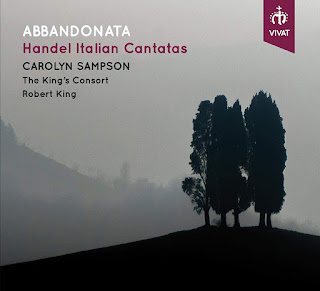Handel Italian cantatas; Carolyn Sampson, The King's Consort, Robert King; VIVAT
Reviewed by Robert Hugill on 23 October 2018
Star rating: (★★★★)
Some of Handel's best known Italian solo cantatas in wonderfully engaging performances
On this new disc from Vivat, soprano Carolyn Sampson joins Robert King and The King's Consort, for a group of Handel's Italian cantatas, all dating from his period in Italy from 1706-1710, Armida abbandonata HWV105, Tra le fiamme HWV170, Figlio d'alle speranze HWV 113 and Agrippina condotta a morire HWWV 110.
Reviewed by Robert Hugill on 23 October 2018
Star rating: (★★★★)
Some of Handel's best known Italian solo cantatas in wonderfully engaging performances
On this new disc from Vivat, soprano Carolyn Sampson joins Robert King and The King's Consort, for a group of Handel's Italian cantatas, all dating from his period in Italy from 1706-1710, Armida abbandonata HWV105, Tra le fiamme HWV170, Figlio d'alle speranze HWV 113 and Agrippina condotta a morire HWWV 110.
All four of these are chamber cantatas, originally intended for performance in a patron's salon. Often Handel wrote for just voice and continuo, with some like the ones on the disc adding extra instruments to the mix. Whilst Handel did perform cantatas and more intimate pieces in the houses of his patrons during his English period, the cantata form is very much associated with Handel in Italy simply because of the sheer profusion of cantatas written. And Handel would use these cantatas as a wonderful source of material for his later operas.
But, though clearly operatic at times, these pieces can be more intimate than an operatic scene, and Handel was often more daring. In cantatas like Agrippina condotta a morire, the desperation of the heroine is reflected in the flexibility of form, with Handel blurring the boundaries between recitative and aria. Characters in cantatas, usually but not always women, were frequently on an emotional knife-edge, and Handel reflects this brilliantly in the music. So here with have both Armida and Agrippina, but the specific character matters less than the emotional turmoil into which they are placed.
That is not to say that the pieces are not bravura, but rarely is technical display for its own sake and quite often there is as much drama to be had in the recitatives. Any singer needs to bear in mind that these were chamber pieces made to be sung by Italians to Italians, the words count.
Carolyn Sampson has been expanding her vocal and dramatic range, recently making her debut as Debussy's Melisande with Scottish Opera in 2017 [see the review on Bachtrack]. This very much shows in her performance, where the recitatives, ariosos and accompagnatos get as much attention as the arias. Text is brilliantly projected, and each character is created in a the sense of Sampson taking them on a clear journey.
There are some stupendously vivid moments in the recitatives, particularly the accompanied ones, yet when the arias get bravura we have some virtuoso fireworks too, without emotion being left behind. And there is real personality behind the performances.
The emotional turmoil of Agrippina comes out best, I think, because here we have real bravura moments alongside Handel's daring in his fluid approach to structure, and Samson moves from vivid recitative to beautifully plangent lines, and virtuoso passages. Armida comes over as beautifully expressive and very intimate. In Tra le fiamme, we start to notice the imagination with which Handel uses the various instruments (and in a booklet note, Robert King mentions how they experimented with Italian recorders tuned a tone higher than ordinary ones). But there are delightful moments in all the cantatas.
The King's Consort accompany with finesse, creating a real chamber music feel to the pieces, and the various different instrumental colours come across brilliantly. We have fine solo playing from individuals, but overall it is the sense of a chamber musicians' give and take which gives the pieces strength.
My only gripe about the disc is that we have the well known cantatas, and you cannot help wishing that we could have had a couple of the rarer ones. Perhaps we might hope that the performers will create a follow-up disc.
George Frideric Handel (1685-1759) - Armida abbandonata, HWV 105
George Frideric Handel - Tra le fiamme, HWV 170
George Frideric Handel - Figlio d'alte speranze, HWV 113
George Frideric Handel - Agrippina condotta a morire, HWV 110
Carolyn Sampson (soprano)
The King's Consort
Robert King
Recorded Alpheton New Maltings, Suffolk, 9-12 March 2018
VIVAT 117 1CD [75.08]
Available from Amazon.
Elsewhere on this blog:
- Vivid story telling: Schubert's Swansong with Sir John Tomlinson and Christopher Glynn (★★★★) - CD review;
- Music for Windy Instruments: Sounds from the court of King James I (★★★½) - CD review
- Independent Opera Showcase Recital at Wigmore Hall (★★★½) - concert review
- Damn fine music: Stanford's Mass Via Victrix (1914-1918) receives its belated premiere - feature
- A visit to Italy at the Oxford Lieder Festival (★★★★) - concert review
- Untold riches - music from Estonia & the Baltic at the Oxford Lieder Festival (★★★★) - concert review
- Southbank Sinfonia and Vladimir Ashkenazy in Grieg, Prokofiev and Beethoven (★★★★) - concert review
- A Bernstein Celebration - London English Song Festival - concert review
- Hansel & Gretel: a nightmare in eight scenes (★★★) - theatre review
- Something for everyone: Gershwin's Porgy and Bess from English National Opera (★★★★) - opera review
- Handel's Radamisto from English Touring Opera (★★★★½) - Opera review
- Portrait of a life (or many): Art songs from the African diaspora (★★★★) - concert review
- Crowd-funding & collaboration: new choral music from Lumen - interview
- Double concerto for bandoneon and violin (★★★½) - CD review
- Home












No comments:
Post a Comment